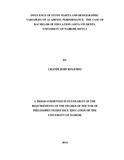| dc.description.abstract | The purpose of this study was to investigate the influence of study habits and
demographic variables on academic performance in distance learning students taking
Bachelor of Education (Arts).The study investigated the influence of time management,
learner-to-learner interaction, note-taking skills, reading skills, demographic variables
and academic performance of distance learning students. Given the increasing numbers
of post-secondary institutions offering degrees by distance learning, it is important to
know the influence of study habits and demographic variables on academic performance
of distance learning students. A total number of 347 students were selected using
stratified random sampling technique from a population of 4,500 students who were
registered for the B.Ed. degree in different years of study. A mixed mode method
approach was used in data collection. The design used was descriptive survey with cross
sectional data collected. The study focused on selected demographic variables which
included age and marital status, gender and highest level of education, monthly income
of the learners, and occupation of the learners. To capture the variables under
investigation a set of questions was developed to assess the opinion of students about
each variable of the study and the length of time the students spent on each. An interview
guide was also designed for the resident lecturers. The study also used focused group
discussions and observation in collecting data. The analysis of the data was done using
Statistical Package for Social Sciences (SPSS) and Statistical Data Analysis (stata)
package. Percentages, means, standard deviations, Pearson product moment correlation,
Analysis of variance were used for the data analyses. The value of the coefficient of
determination (r2) was used to explain the proportion of the dependent variable that is
accounted for by the independent variable. The findings indicated a strong positive
influence of time management on academic performance (r =0.569), There was a
positive influence of notes-taking on academic performance (r=0.635), influence of
reading skills on academic performance (r =0.423), and influence of highest academic
qualification on their academic performance of adult learners (r=0.237). There was
however no significant influence of age, marital status, gender, type of occupation,
students’ highest secondary performance on academic performance in the programme.
Based on the findings, the study recommended that students should be trained in time
management skills and also they should be encouraged to meet regularly for
discussions.Learners should also be trained on how to take notes. | en_US |

